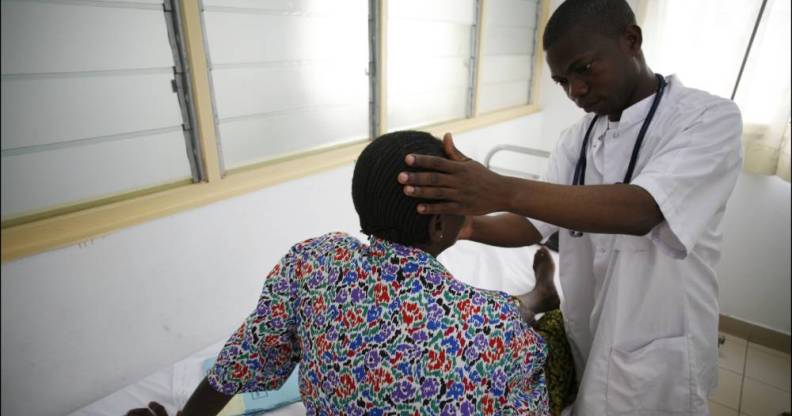HIV researchers find rare group of ‘elite controllers’ who could be a key to unlocking new treatments

Doctor Patrick Nzounza, CTA medical coordinator in the Congo (Brazzaville and Pointe Noire) global treatment centre for HIV/AIDS sufferers. (Photo by Jean-Luc LUYSSEN/Gamma-Rapho via Getty Images)
HIV researchers believe a number of ‘elite controllers’ in the Democratic Republic of the Congo (DRC) could be critical in finding new ways to treat the virus.
Researchers found an “unusually high number of people” in the DRC who have tested positive for HIV antibodies but show no signs of the live virus – without the use of treatments. The researchers referred to these people as HIV elite controllers.
According to the researchers, the finding of these elite controllers could help uncover new HIV treatments and even potentially vaccines.
The scientists found that the prevalence of HIV elite controllers was between 2.7 to 4.3 per cent of the group of 10,457 people studied in the DRC. Globally, elite controllers make up between 0.1 to 2 per cent of cases.
Tom Quinn, director of the Johns Hopkins Center for Global Health and chief of the international HIV/AIDS research section of the National Institute of Allergy and Infectious Diseases, said the finding of a large group of HIV elite controllers in the DRC is “significant” considering HIV is a “life-long, chronic condition that typically progresses over time”.
“There have been rare instances of the infection not progressing in individuals prior to this study, but this high frequency is unusual and suggests there is something interesting happening at a physiological level in the DRC that’s not random,” Quinn said.
The researchers hope future study of this group could help uncover links between natural suppression of HIV and future treatments as scientists worldwide work towards a cure.
Carole McArthur, a professor of oral and craniofacial sciences at the University of Missouri — Kansas City and director of residency research in pathology at the Truman Medical Center, said every new HIV discovery is “another piece in the evolutionary jigsaw puzzle”.
McArthur added: “Each of these pieces helps us see a bit more clearly as to where we need to look next and contributes to the knowledge bank that all researchers will turn to in the next phase of our work.”
Since the beginning of the HIV/AIDS epidemic, 76 million people have been infected with the virus.
The World Health Organization (WHO) estimates that about 33 million people have died from HIV/AIDS. Around 38 million people worldwide were living with HIV at the end of 2019. In 2019 alone, 690,000 people died from HIV-related illnesses.
The WHO said Africa remains the most severely affected region with nearly one in every 25 (3.7 per cent) adults living with HIV. This group also accounts for more than two-thirds of people living with HIV worldwide.
In 2014, researchers confirmed that the HIV pandemic originated in the DRC in the 1920s. Researchers at the University of Oxford and and the University of Leuven found its source with “a high degree of certainty” – with its ‘family tree’ leading to Kinshasa in the 1920s.
The new study on HIV elite controllers in the DRC, published in the journal eBioMedicine, was from a team including Abbott, Johns Hopkins University, National Institute of Allergy and Infectious Diseases, University of Missouri – Kansas City and the Université Protestante au Congo.

